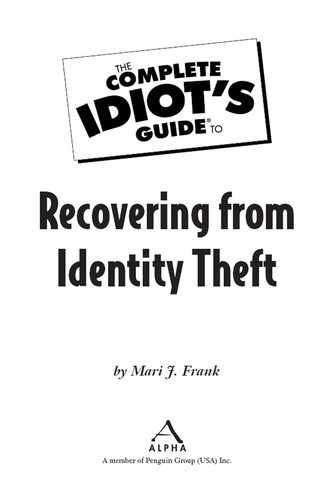Credit-Card Rights
Take a deep breath. You’ll be happy to know that credit-card fraud, although rampant, is often the most straightforward fraud to cure. There are two types of credit-card fraud: account-takeover and application fraud. Each one needs different handling.

Legal Lingo
In account-takeover credit-card fraud, someone charges purchases to your own credit cards.
Application fraud means that someone has used your identity to establish new credit-card accounts that you don’t know about.
The Fair Credit Billing Act is a law, passed in 1986, that changed the Truth in Lending Act to “protect the consumer against inaccurate and unfair credit billing and credit-card practices.”
Just as you have rights to dispute information on your credit report, you also have rights in dealing with fraudulent credit-card charges in your name. Depending on the situation, different sets of laws can come into play.
For cases of account-takeover fraud, where someone is charging purchases to your own credit card, the applicable law is the Fair Credit Billing Act (FCBA). This law specifically applies to open-ended accounts like credit cards and applies to billing errors, including unauthorized charges, such as fraud.
Here are your rights and responsibilities under the law:
♦ You must dispute charges in writing.
♦ Your dispute must arrive at the creditor within 60 days of the first date that the bill(s) with the erroneous or fraudulent charges were mailed to you.
♦ The credit-card company must acknowledge your letter within 30 days of receipt. (Chapter 18 covers what to do when companies or institutions don’t cooperate.)
♦ The company must resolve the dispute within two billing cycles, but not longer than 90 days, of receiving your letter.
♦ You don’t have to pay the disputed or fraudulent charges during the investigation, although you must pay undisputed charges, including finance charges on accurate charges.
♦ The company cannot report you as delinquent to the CRAs, or even threaten to report derogatory information, while the matter is in dispute. However, it can report that you are challenging a bill.
♦ If the company fails to meet the statutory deadlines, then it must take the disputed charges off your account even if it thinks that the charges are legitimate.
If an account is created by the fraudster, your rights derive from the Fair Credit Billing Act and the Fair Debt Collection Practices Act, and you have major rights under the Fair Credit Reporting Act, the same law that governs how consumers deal with credit reports. Here is what you’re legally entitled to from a credit-card company:

Information = Power
Under federal law, credit-card issuers must cover all but $50 of any losses that result from fraudulent credit-card charges. But the good news is all issuers will absorb the first $50 if you prove the charges are fraudulent.
♦ You have the right to dispute the account as fraudulent. You must provide a written explanation of the fraud and attach an identity-theft report. You must also complete the FTC identity-theft affidavit and provide evidence of your identity.
♦ Upon your written request, the card issuer must give you copies of the fraudulent credit-card application and copies of billing statements and correspondence regarding the bill.
♦ The issuer must provide you with this documentation within 30 days of your request and cannot charge you for it.
♦ As a victim, you may also authorize a law-enforcement investigator to receive the same records without a court order.
♦ You have a right to demand that the issuer send notice to the CRAs to remove the accounts and inquiries regarding the account from your credit reports.
Later in this chapter, I will show you how to clear the fraudulent credit-card information off your credit file.
..................Content has been hidden....................
You can't read the all page of ebook, please click here login for view all page.
